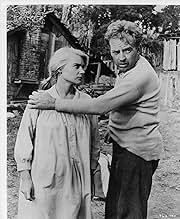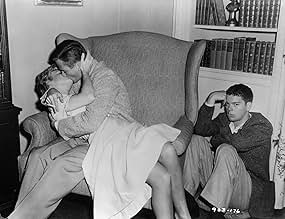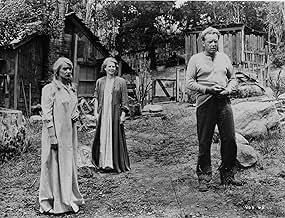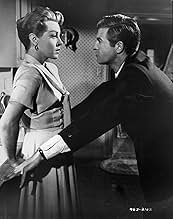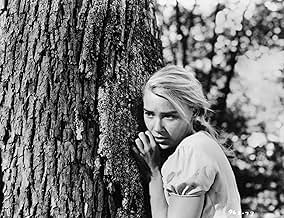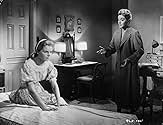VALUTAZIONE IMDb
7,2/10
7010
LA TUA VALUTAZIONE
Una tranquilla cittadina del New England nasconde segreti e scandali.Una tranquilla cittadina del New England nasconde segreti e scandali.Una tranquilla cittadina del New England nasconde segreti e scandali.
- Candidato a 9 Oscar
- 2 vittorie e 17 candidature totali
Recensioni in evidenza
The Hollywood melodrama is a magical thing. You could fixate on one for a century, devouring its unrealistic rosiness and torrid, intermingling plot lines. Some directors (William Wyler, Edmund Goulding) are able to nourish them, managing to turn camp into something classier than overwrought trash. But then there are others (Douglas Sirk, Billy Wilder) who can see the fun in the fluff, commenting on the usual inauthenticity while still making a top-notch product.
Peyton Place is the granddaddy of all Hollywood melodramas, not quite self-referential but not quite forgettable. It's just right. At nearly three hours, it is everything Days of Our Lives and The Bold and the Beautiful ever wanted to be. It has only three moods: romantic, stormily melodramatic, or vanilla, like Leave It to Beaver. These moods never mix together with continuity — there only seems to be room for the loudest of colors, shades and subtleties burnt to a crisp. Scenes are designed with the dramatized emphasis of a fashion magazine photoshoot, practically screaming that, yes, the film has a big-budget, and yes, it can afford to be filmed in CinemaScope.
Peyton Place isn't a smart melodrama cut from the same cloth as Written on the Wind, but thanks to shows like Twin Peaks, vintage soap has been given an entirely new edge. Instead of watching one for its unfiltered clutter, there seems to be a satirical acidity at play, even if it isn't on purpose. Landscape shots have the phony cheerfulness of a tempting postcard. Neighborhoods are decked out with white-picket fences, green grass, sunny skies, and clean-cut youths. Everything is too immaculate. You can sense that there is a lot of drama going on behind closed doors.
To explain the piling of story lines would be like patting my head and rubbing my stomach while typing; they have the same complexities as a family tree of socialites. All I will say is that Lana Turner is named Constance McKenzie (a name that was perhaps chosen by a soap opera character generator), and she, along with her daughter (Diane Varsi), acquaintances, and old-time friends, live in Peyton Place, an idyllic town stationed in rural New England. Gossip travels faster than a speeding bullet, romances begin as often as babies are born, and a scandal can destroy a person's life with more pain than a knife to the chest. I may enjoy watching tragedy happen to other people, but is it wrong to say that I would not be opposed to living in a town this exciting?
In Peyton Place, a blistery kiss or a b*tch slap to a well-endowed mug become the equivalents of a fiery explosion. It is hammier than Bette Davis eating a ham sandwich with Joan Crawford and Miriam Hopkins. There is plenty to stare at and gasp at and cry at and emote at, however ridiculous. We know that it's bad for us, but it is impossible not to consume something that wraps us up in a tweed suit and transports us into a parallel universe of cracked perfection. The youths, no matter how flawless they first appear, are either loose cannons on full throttle or suppressed lightweights waiting to blow up. The passive aggressive judgment of Peyton Place eventually sets their path and decides if they will be the talk-of-the-town for the rest of their life or the neighbor you beam at when you pass them at the grocery store.
Fittingly, the film became a hit not for its merit, not for its acting, not for its artistic capabilities, but because of a scandal possibly too jaw-dropping for the confines of Peyton Place. Long story short: At the time, Lana Turner was dating Mickey Cohen's right-hand man. One night, he flew into a rage, and, in response, her daughter came to her defense, stabbing him to death. Peyton Place had been out for months, making little money, but once the nonstop headlines began, it became the second highest grossing movie of 1958. Looking back, the Turner ordeal was and still is the kind of sh*t America feeds on with a frenzy. No one wants to admit that they enjoy some garbage here and there, but I'm sure the majority of InTouch readers indulge themselves not because they find value in celebrity gossip but because they find all the melodramatic lies to be a h*ll of a lot more entertaining than the intellect of Vanity Fair. As far as publicity goes, Peyton Place got its sharing served on a silver platter. What better suits faux soap than real soap?
Even with the unforgiving attention surrounding her, Turner has certainly never been better. Throughout the 1940s, she was mostly placed into the shoes of the sexy love interest, sometimes a femme fatale and sometimes the sweet girl you can't wait to go home to after fighting overseas. In Peyton Place, she is appealingly breathy, always ready with cocked eyebrow, perpetually p*ssed off at how her messy past affects her currently dusty one. She blows cigarette smoke as if she's late for an upcoming confrontation with an old mistake. Turner carries the weight of the film on her shoulders, working as its emotional core and its best actor. Some could declare her work as pure overacting, but on Peyton Place's terms, she comes out a champion. Few can say that murder lead to their career resurgence, but Turner is more than able.
One could accuse Peyton Place of being too preachy to be completely successful, but its influence is undeniable. It propelled the careers of talented young actors (Russ Tamblyn, Hope Lange), and lead to a popular TV spin-off in the 1960s, setting the standard for modern soap operas. As a standalone film, it works as a well-made, wildly entertaining soaper. The two-hours and 37 minutes go by with lightning speed; one could say that the film is too short, a good sign if there ever was one.
Peyton Place is the granddaddy of all Hollywood melodramas, not quite self-referential but not quite forgettable. It's just right. At nearly three hours, it is everything Days of Our Lives and The Bold and the Beautiful ever wanted to be. It has only three moods: romantic, stormily melodramatic, or vanilla, like Leave It to Beaver. These moods never mix together with continuity — there only seems to be room for the loudest of colors, shades and subtleties burnt to a crisp. Scenes are designed with the dramatized emphasis of a fashion magazine photoshoot, practically screaming that, yes, the film has a big-budget, and yes, it can afford to be filmed in CinemaScope.
Peyton Place isn't a smart melodrama cut from the same cloth as Written on the Wind, but thanks to shows like Twin Peaks, vintage soap has been given an entirely new edge. Instead of watching one for its unfiltered clutter, there seems to be a satirical acidity at play, even if it isn't on purpose. Landscape shots have the phony cheerfulness of a tempting postcard. Neighborhoods are decked out with white-picket fences, green grass, sunny skies, and clean-cut youths. Everything is too immaculate. You can sense that there is a lot of drama going on behind closed doors.
To explain the piling of story lines would be like patting my head and rubbing my stomach while typing; they have the same complexities as a family tree of socialites. All I will say is that Lana Turner is named Constance McKenzie (a name that was perhaps chosen by a soap opera character generator), and she, along with her daughter (Diane Varsi), acquaintances, and old-time friends, live in Peyton Place, an idyllic town stationed in rural New England. Gossip travels faster than a speeding bullet, romances begin as often as babies are born, and a scandal can destroy a person's life with more pain than a knife to the chest. I may enjoy watching tragedy happen to other people, but is it wrong to say that I would not be opposed to living in a town this exciting?
In Peyton Place, a blistery kiss or a b*tch slap to a well-endowed mug become the equivalents of a fiery explosion. It is hammier than Bette Davis eating a ham sandwich with Joan Crawford and Miriam Hopkins. There is plenty to stare at and gasp at and cry at and emote at, however ridiculous. We know that it's bad for us, but it is impossible not to consume something that wraps us up in a tweed suit and transports us into a parallel universe of cracked perfection. The youths, no matter how flawless they first appear, are either loose cannons on full throttle or suppressed lightweights waiting to blow up. The passive aggressive judgment of Peyton Place eventually sets their path and decides if they will be the talk-of-the-town for the rest of their life or the neighbor you beam at when you pass them at the grocery store.
Fittingly, the film became a hit not for its merit, not for its acting, not for its artistic capabilities, but because of a scandal possibly too jaw-dropping for the confines of Peyton Place. Long story short: At the time, Lana Turner was dating Mickey Cohen's right-hand man. One night, he flew into a rage, and, in response, her daughter came to her defense, stabbing him to death. Peyton Place had been out for months, making little money, but once the nonstop headlines began, it became the second highest grossing movie of 1958. Looking back, the Turner ordeal was and still is the kind of sh*t America feeds on with a frenzy. No one wants to admit that they enjoy some garbage here and there, but I'm sure the majority of InTouch readers indulge themselves not because they find value in celebrity gossip but because they find all the melodramatic lies to be a h*ll of a lot more entertaining than the intellect of Vanity Fair. As far as publicity goes, Peyton Place got its sharing served on a silver platter. What better suits faux soap than real soap?
Even with the unforgiving attention surrounding her, Turner has certainly never been better. Throughout the 1940s, she was mostly placed into the shoes of the sexy love interest, sometimes a femme fatale and sometimes the sweet girl you can't wait to go home to after fighting overseas. In Peyton Place, she is appealingly breathy, always ready with cocked eyebrow, perpetually p*ssed off at how her messy past affects her currently dusty one. She blows cigarette smoke as if she's late for an upcoming confrontation with an old mistake. Turner carries the weight of the film on her shoulders, working as its emotional core and its best actor. Some could declare her work as pure overacting, but on Peyton Place's terms, she comes out a champion. Few can say that murder lead to their career resurgence, but Turner is more than able.
One could accuse Peyton Place of being too preachy to be completely successful, but its influence is undeniable. It propelled the careers of talented young actors (Russ Tamblyn, Hope Lange), and lead to a popular TV spin-off in the 1960s, setting the standard for modern soap operas. As a standalone film, it works as a well-made, wildly entertaining soaper. The two-hours and 37 minutes go by with lightning speed; one could say that the film is too short, a good sign if there ever was one.
Grace Metalious' explosive best-selling novel is given the Hollywood treatment in 1957's "Peyton Place". Devoid of so much of the nonsense that has been known to permeate other melodramas, "Peyton Place" is a beautifully filmed, effective film that uncovers the hidden scandals of a quaint, New England town. With fine acting, score and cinematography, this screen classic translates well from its literary heritage. And the film's unraveling of the town's secrets is handled well - building up like a ball of snow as each successive scandal is unearthed.
We meet the townspeople from the point-of-view of Allison Mackenzie(Diane Varsi), the sweet and sheltered daughter of Constance(Lana Turner). Constance struggles to be a good mother and community member, while rebuffing the advances of handsome school principal, Michael Rossi(Lee Philips). On the other side of the tracks live Constance's housekeeper whose daughter, Selena(Hope Lange), struggles as a victim of abuse by her own step-father. In the midst of these primary plots are several other tales revolving around sex, love and the war. No one is immune to the reveal of secrets, which have a domino effect all across town.
"Peyton Place" shook the foundation of Hollywood's censorship board by exposing such taboo topics as sexual abuse and abortion, but not once does it come off as exploitative. On the contrary, the film is firmly grounded in emotion and genuine feeling. And while the movie straddles the line of good taste, a plot involving the war effort and its effect on the young men of Peyton Place proves to be profound. Lana Turner does her job well as the repressed mother. In fact, heated passion can be sensed underneath her aloof, icy-cold exterior - a chill factor even more effective 2 years later in "Imitation of Life". And the incredibly good-looking Lee Philip is a perfect match the screen beauty. But it is really with the sensitive performances of Diane Varsi and Hope Lange that this film gains its legs. And Lloyd Nolan cannot be overlooked as the town's warm-hearted doctor. "Peyton Place" could have been a heaving, overblown showcase, but instead made its way into becoming an important melodrama that has stood the test of time.
We meet the townspeople from the point-of-view of Allison Mackenzie(Diane Varsi), the sweet and sheltered daughter of Constance(Lana Turner). Constance struggles to be a good mother and community member, while rebuffing the advances of handsome school principal, Michael Rossi(Lee Philips). On the other side of the tracks live Constance's housekeeper whose daughter, Selena(Hope Lange), struggles as a victim of abuse by her own step-father. In the midst of these primary plots are several other tales revolving around sex, love and the war. No one is immune to the reveal of secrets, which have a domino effect all across town.
"Peyton Place" shook the foundation of Hollywood's censorship board by exposing such taboo topics as sexual abuse and abortion, but not once does it come off as exploitative. On the contrary, the film is firmly grounded in emotion and genuine feeling. And while the movie straddles the line of good taste, a plot involving the war effort and its effect on the young men of Peyton Place proves to be profound. Lana Turner does her job well as the repressed mother. In fact, heated passion can be sensed underneath her aloof, icy-cold exterior - a chill factor even more effective 2 years later in "Imitation of Life". And the incredibly good-looking Lee Philip is a perfect match the screen beauty. But it is really with the sensitive performances of Diane Varsi and Hope Lange that this film gains its legs. And Lloyd Nolan cannot be overlooked as the town's warm-hearted doctor. "Peyton Place" could have been a heaving, overblown showcase, but instead made its way into becoming an important melodrama that has stood the test of time.
Grace Metalious' bestseller comes to the screen with lavish good taste, but the small town scandals depicted are not entirely white-washed. Glossy melodrama directed by Mark Robson allows star Lana Turner to suffer nobly, playing single mother to graduating teenager Diane Varsi, harboring a skeleton in her family closet while being romanced by high school principal Lee Philips (in an appealing performance). Varsi and her friends are all awakening to the joys of boy-girl coupling, unsure about sex and not about to ask their parents for help. Involving and polished, though just a bit stiff or starchy. The courtroom climax (with shopgirl Hope Lange on trial for killing her abusive step-father) is really corny, but fans of the soap genre will be enthralled. Fashioned into a popular television serial starting in 1964. Followed by "Return to Peyton Place" in 1961, which featured none of the talents assembled here. *** from ****
Okay, so I wasn't alive in the 50s. But my father certainly was.
He recommended this movie to me, and I have to say -- I was impressed.
It represents one of the few mainstream films of the era that presented day-to-day life as it really was. Peyton Place is a movie that strips away the candy-coated exterior which surrounds many a 50s film, and shows the raw and flawed lives of people who are struggling with issues that viewers in today's society can still relate to.
Although a different genre, it wasn't until I delved deeper into Film Noir that I discovered more films that presented an edgier and raw window into the world of the 40s and 50s. I appreciate a writer or director that has the guts to risk losing viewers by insisting on honest presentation of culture or events.
This film is worth a look.
He recommended this movie to me, and I have to say -- I was impressed.
It represents one of the few mainstream films of the era that presented day-to-day life as it really was. Peyton Place is a movie that strips away the candy-coated exterior which surrounds many a 50s film, and shows the raw and flawed lives of people who are struggling with issues that viewers in today's society can still relate to.
Although a different genre, it wasn't until I delved deeper into Film Noir that I discovered more films that presented an edgier and raw window into the world of the 40s and 50s. I appreciate a writer or director that has the guts to risk losing viewers by insisting on honest presentation of culture or events.
This film is worth a look.
The Granddaddy of all soap operas, Peyton Place has its place in film and television history. When the steamy best seller by Grace Metalious and film by Jerry Wald and 20th Century Fox were converted into a television series, it set a standard for evening prime time soap operas that some will argue has never been equaled.
Times have surely changed. Set in New England as it is if Peyton Place existed it's now in the vanguard of blue state America. But in 1941 Peyton Place in New England would probably have enjoyed keeping cool with native son Calvin Coolidge and no doubt voted for Hoover, Landon, and Wilkie instead of that radical FDR in the White House.
In this prim and proper New England town it's all about keeping up appearances. Everybody knows everyone so if things aren't quite fitting the America of Norman Rockwell you keep them behind closed doors.
Like Lana Turner never bothering to tell daughter Diane Varsi that she's an out of wedlock child, like poor Russ Tamblyn not being able to relate to the opposite sex in his teen years, like Hope Lange living with a brutal rampaging father in Arthur Kennedy who physically abuses her mother Betty Field and does more than that with her.
Leon Ames as the town's employer, owner of the mill where most of the town works maybe the leading citizen, but the town's moral authority is Lloyd Nolan, a very wise and caring doctor, the kind of small town doctor who's a passing memory.
It's impossible to describe the plot of Peyton Place because there are so many strands in the plot fabric. It all works very well courtesy of screenwriter John Michael Hayes and director Mark Robson. The whole thing is narrated by Diane Varsi as Allison McKenzie who grew up and wrote a book about her home town.
Peyton Place got nine Oscar nominations, but unfortunately lost a lot of awards it was up for to The Bridge On The River Kwai. Lana Turner's one and only nomination came in a year that the Academy voters gave the Best Actress Award to relative newcomer Joanne Woodward. Russ Tamblyn and Arthur Kennedy split the vote and Red Buttons won for Sayonara for Best Supporting Actor and the same thing happened with the Best Supporting Actress with Diane Varsi and Hope Lange splitting for Miyoshi Umeki to win for Sayonara as well.
The Code was still firmly in place and had it not been I think Russ Tamblyn's character would have been more explicitly gay. Here he's a timid young man not comfortable with the opposite sex and not real popular among his own heterosexist males. Then as now, gays are not real comfortable in most small towns.
Still for those who like their big screen soap operas, you'll love Peyton Place, even with changing mores the film holds up well.
Times have surely changed. Set in New England as it is if Peyton Place existed it's now in the vanguard of blue state America. But in 1941 Peyton Place in New England would probably have enjoyed keeping cool with native son Calvin Coolidge and no doubt voted for Hoover, Landon, and Wilkie instead of that radical FDR in the White House.
In this prim and proper New England town it's all about keeping up appearances. Everybody knows everyone so if things aren't quite fitting the America of Norman Rockwell you keep them behind closed doors.
Like Lana Turner never bothering to tell daughter Diane Varsi that she's an out of wedlock child, like poor Russ Tamblyn not being able to relate to the opposite sex in his teen years, like Hope Lange living with a brutal rampaging father in Arthur Kennedy who physically abuses her mother Betty Field and does more than that with her.
Leon Ames as the town's employer, owner of the mill where most of the town works maybe the leading citizen, but the town's moral authority is Lloyd Nolan, a very wise and caring doctor, the kind of small town doctor who's a passing memory.
It's impossible to describe the plot of Peyton Place because there are so many strands in the plot fabric. It all works very well courtesy of screenwriter John Michael Hayes and director Mark Robson. The whole thing is narrated by Diane Varsi as Allison McKenzie who grew up and wrote a book about her home town.
Peyton Place got nine Oscar nominations, but unfortunately lost a lot of awards it was up for to The Bridge On The River Kwai. Lana Turner's one and only nomination came in a year that the Academy voters gave the Best Actress Award to relative newcomer Joanne Woodward. Russ Tamblyn and Arthur Kennedy split the vote and Red Buttons won for Sayonara for Best Supporting Actor and the same thing happened with the Best Supporting Actress with Diane Varsi and Hope Lange splitting for Miyoshi Umeki to win for Sayonara as well.
The Code was still firmly in place and had it not been I think Russ Tamblyn's character would have been more explicitly gay. Here he's a timid young man not comfortable with the opposite sex and not real popular among his own heterosexist males. Then as now, gays are not real comfortable in most small towns.
Still for those who like their big screen soap operas, you'll love Peyton Place, even with changing mores the film holds up well.
Lo sapevi?
- QuizSome of the shots of the New England fall were shot for La congiura degli innocenti (1955).
- BlooperAll of the women's hair styles and clothing are strictly 1957, not 1941.
- Citazioni
Mr. Harrington: This job starts at 3,000 a year.
Michael Rossi: Then we're all wasting our time. That's only $5 a week more than I was making as a teacher, Mr. Harrington
Mr. Harrington: But this offers you security -- a long term contract.
Michael Rossi: Guaranteed poverty is not security.
- Versioni alternative(Spoiler) Originally premiered at 162 minutes. Cut by 5 minutes, shortly after premiere, reputedly in the scene involving the murder of Arthur Kennedy's character.
- ConnessioniFeatured in 20th Century-Fox: The First 50 Years (1997)
- Colonne sonoreWonderful Season of Love (Theme from Peyton Place)
(uncredited)
Music by Franz Waxman
Lyrics by Paul Francis Webster
[Sung by chorus over closing credits]
I più visti
Accedi per valutare e creare un elenco di titoli salvati per ottenere consigli personalizzati
- How long is Peyton Place?Powered by Alexa
Dettagli
- Data di uscita
- Paese di origine
- Sito ufficiale
- Lingua
- Celebre anche come
- Peyton Place
- Luoghi delle riprese
- Camden, Maine, Stati Uniti(Exterior)
- Aziende produttrici
- Vedi altri crediti dell’azienda su IMDbPro
Botteghino
- Lordo Stati Uniti e Canada
- 25.600.000 USD
- Tempo di esecuzione2 ore 37 minuti
- Colore
- Proporzioni
- 2.35 : 1
Contribuisci a questa pagina
Suggerisci una modifica o aggiungi i contenuti mancanti

Divario superiore
By what name was I peccatori di Peyton (1957) officially released in India in English?
Rispondi

